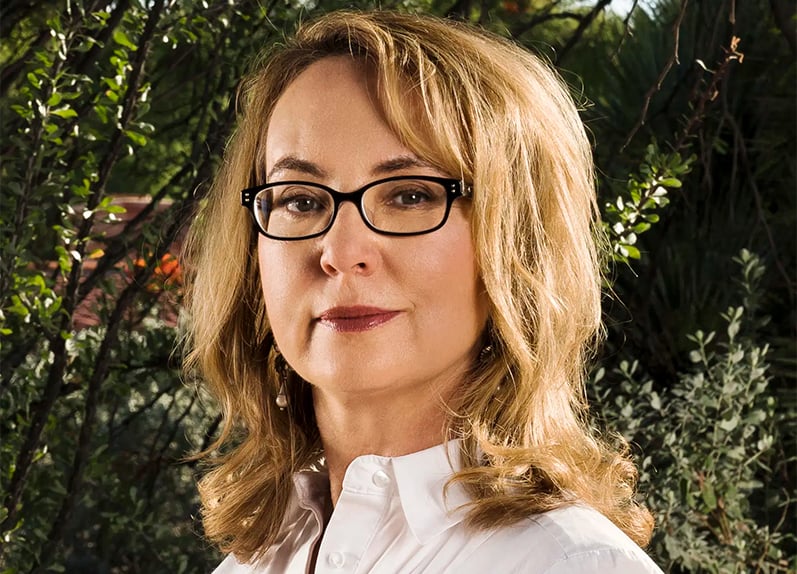Gabby Giffords returns to Scripps for documentary screening, discussion

By Lisa Butterworth | special to the Courier
In 1993, Gabby Giffords graduated from Scripps College with a B.A. in sociology and Latin American history. Eighteen years later, she had just begun her third term as an Arizona Congresswoman when on January 8, 2011, while speaking at a “Congress on Your Corner” event in Tucson, she survived a gunshot to the head. Six people were killed and 13 others injured in the mass shooting.
Giffords, who now runs an eponymous gun-safety advocacy group, embarked on a difficult and ongoing road to recovery, captured in the recently released documentary “Gabby Giffords Won’t Back Down.”
At 6 p.m. Tuesday, March 7, Giffords returns to her alma mater, where, she said, “I built strong friendships, improved my self-confidence, and learned how to be a leader,” for a free and open to the public screening and panel discussion of the documentary at Garrison Theater, 1030 Columbia Ave., Claremont.
In addition to her gun control advocacy, Giffords is raising awareness about aphasia, a disorder that affects how you communicate, from which she suffers.
“If watching Gabby Giffords Won’t Back Down motivates at least one person to take action,” Giffords said, “I’ll know I’ve done my job.”
Because speech is still a challenge for her, this interview was conducted in Q and A format via email.
How does it feel to return to Scripps?
“It feels wonderful. I have so many happy memories from my time in the Claremont community. On this trip, I want to share a personal look at how my life has changed since I was studying here, through Gabby Giffords Won’t Back Down. My education at Scripps College was a great gift, it helped shape who I am today and taught me that strong women get things done! I’m excited to share this piece of myself.”
What do you hope to inspire in the current students?
“I hope the students here realize, as I once did on the very same campus, that their voices can shape the future. They are uniquely equipped to tackle injustice and elevate the issues that matter most. I’m inspired by them, and students like them, every day.”
Do you have a mantra that’s helped you through your recovery? What motivates you now?
“I’ve had many mantras through the years, but the one I always come back to is ‘Move ahead!’ I don’t like to look back and wish I could change the past, because I can’t. Instead, I try to look ahead to what I want to do with my future. I also have a daily routine that includes a daily bike ride. This has helped me immensely and I love riding in the Arizona sun!
“I am so grateful for my incredibly strong support system. My husband [astronaut and U.S. Senator Mark Kelly] is the rock at the center of my universe. I couldn’t do life without him. These days, I’m motivated by hope. Despite all the tragedy and pain and loss we’ve experienced as a nation, we’ve also achieved so much together. I know a better future lies ahead — that’s what inspires me to keep pushing for change.”

Photo/courtesy of Gabby Giffords
How has the conversation and culture around gun violence changed since the attempt on your life? Are we moving in the right direction?
“In 2011 and 2012, the gun lobby was at its peak — it was reaching record membership and donations, and guns were too controversial a topic for Democrats to run on. After the horrific shooting at Sandy Hook Elementary School, the national conversation and culture around gun violence started to change. Gun violence has since gone from being a political third rail to a kitchen table topic. This crisis touches everyone — nearly every American will know a victim of gun violence in their lifetime.
“Americans are sick of the inaction on this issue, and it’s showing. In 2018, a post-Parkland wave helped elect a gun safety majority in the House. In 2020, we elected the strongest gun safety presidential ticket in history. And in these most recent midterms, exit polling showed gun violence was yet again a top issue for voters.
“After the Sandy Hook shooting, I stood in the Rose Garden alongside then-Vice President Biden and then-President Obama after a Senate filibuster stopped the passage of the Manchin-Toomey background checks bill. In the time since, more than 525 gun safety bills have been enacted in states. And nearly 10 years later, the Bipartisan Safer Communities Act passed both chambers and included support from 15 Republican senators. Last year, President Biden signed it into law, the first gun safety legislation in nearly 30 years. Things are changing for the better.”
Your organization has been doing important gun violence prevention work for 10 years now. What are you most proud of, and what are you working toward?
“We’ve come so far, and achieved so much. I think I’m most proud of the legislative successes we’ve had in states across the country. Even when the federal government didn’t take action, we worked in statehouses to get the popular, evidence-based gun safety bills passed and implemented, where they’re having a real impact on their communities.
“And when the federal government did take action, we were right there working with lawmakers to make it the strongest bill possible. The Bipartisan Safer Communities Act may not include everything we wanted, but it’s saving lives. Like my own recovery, progress happens inch by inch. Our main goal is always to save lives, save lives, save lives.”
How can readers, inspired by your story, engage in this kind of advocacy?
“Get involved! Our communities need you, and making progress at the local level is just as important as doing so nationally. Solving the issues and injustices of our time will be a marathon, not a sprint—no effort or achievement is too small. Find something you’re passionate about and start where you can.”
Can you tell us about the importance of music in your life, especially as it pertains to your recovery?
“Music therapy played an important role in the early days of my recovery. Before I could speak words, I was able to sing songs. Doing so lifted my spirits and helped me power through the difficulties in my fight to speak again. These days, when I’m looking for a pick-me-up, I turn on ’80s music — Cyndi Lauper’s “Girls Just Want to Have Fun” is one of my favorites!
“I played French horn as a girl, and it’s been so wonderful to relearn how to play and take lessons again as an adult. Just like with my speech therapy, playing an instrument requires a lot of practice. It helps me with my work in gun violence prevention, too: you have to put in the hours, you do best if you’re working with a supportive community, and you have to keep trying, even when things get hard. In 2021 I was lucky enough to show off my new skills and play with Yo-Yo Ma. It was a great honor.”
Where do you find joy these days?
“I find joy in the small things, from riding my bike and learning the French horn to spending time with friends and family.”
The free and open to the public screening of “Gabby Giffords Won’t Back Down” takes place at 6 p.m. Tuesday, March 7 at Garrison Theater, 1030 Columbia Ave., Claremont. A panel discussion of will follow. More information is at scrippscollege.edu/events.









0 Comments